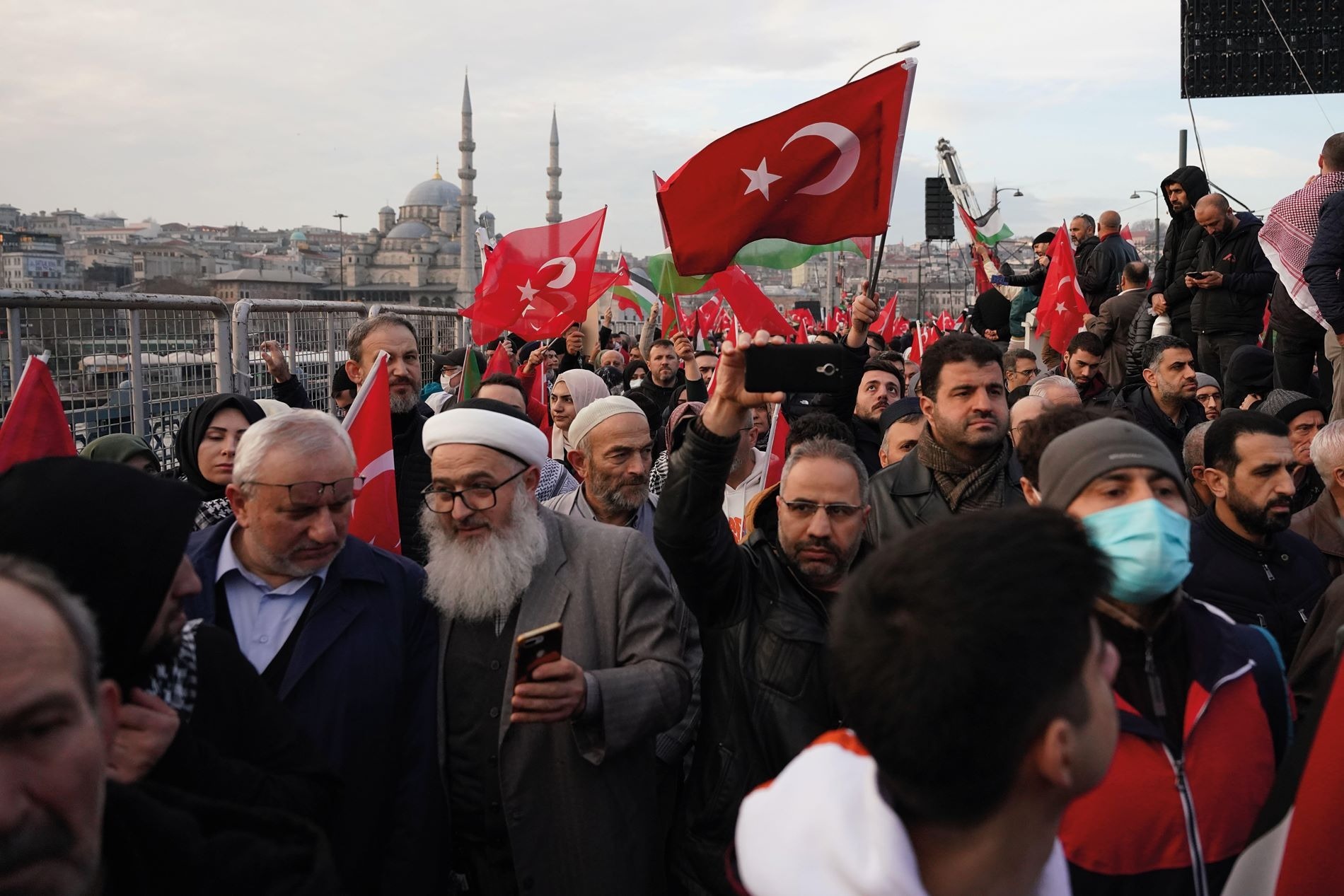Turkey has declared itself a defender of Palestine. But now the people are demanding action and the state is crushing dissent

I was in Istanbul on 7 October 2023, taking a ferry with friends to the nearby Princes’ Islands to enjoy the last days of a prolonged summer. The weather cooled during our ride across the Bosphorus Strait, but it was the news about the massacre by Hamas gunmen that sent a real chill. The outcome of this day for Israelis and Palestinians was and would be lethal, and a friend asked an unnerving question: how would this affect Turkey? How would our president, Recep Tayyip Erdoğan, a longtime ally of the Hamas leadership, respond? Over the next year, the Israel–Hamas war would bring out the worst and the best of Turkey: antisemitic behaviour, intolerance of protesters, but also challenges directed at an autocratic regime by citizens willing to risk arrest and imprisonment to express their views.
By the end of October 2023, four months before mayoral elections, all Turkish politicians could talk about was the Israel–Hamas war. “Hamas isn’t a terrorist organisation; it’s a liberation group, mujahideen,” Erdoğan declared in parliament on 25 October, using the Arabic word for freedom fighters. The president cancelled his planned visit to Israel, which he charged with “behaving like an illegal organisation”. Turkey’s role from now on, Erdoğan announced, would be to “shout out the truth” in a “world full of the living dead” and to use “all political, diplomatic and, if necessary, military means” to this end. By November 2023, Turkey had dispatched 11 planes carrying 700 tons of humanitarian aid, one ship with field hospital equipment, and 20 ambulances to Gaza.
The Turkish opposition’s response was different. “We completely reject Erdoğan’s decision not to recognise Hamas as a terrorist organisation,” said Özgür Özel, the newly-elected leader of the main opposition Republican People’s Party (CHP), the secularist party founded in 1923 by Atatürk. “We also consider it an extremely shameful approach for Turkey. Hamas is a terrorist organisation. In a period when there were no conflicts in Palestine, their attacks targeting civilians in the middle of the night started this process.”
But Erdoğan’s rhetoric of rage had channelled the sentiment of a large section of the Turkish public, who see themselves as allies to Palestine. Two days later, the president held a solidarity rally in Istanbul, which he claimed 1.5 million people attended.
Yet Turkey’s involvement in the Israel–Palestine war has mostly been limited to rhetoric. And while the general fury at Israel was expected, few could have anticipated the public anger that has been unleashed at the Turkish government, perceived as not doing enough to support Palestine, militarily and diplomatically, in the wake of 7 October. That has resulted in a fresh crackdown on protest – even for those supporting Palestine – which has exposed Erdoğan’s vulnerabilities and dented his political support. The last year has also confirmed and deepened the undermining of free speech and democracy in Turkey.
A crackdown on protest
First, activists organised boycotts of global companies they claimed were aligned with Israeli interests, including McDonald’s and Burger King. By December, there were armed attacks. In southern Turkey, an activist entered a Starbucks with a shotgun, shooting at windows and walls as patrons ran for shelter. (Starbucks quickly placed a statement next to its tills denying the chain had ever contributed “to any government or military operation”.)
When I talked to Rıfat Bali, an independent scholar specialising in the history of Turkish Jews, he argued that the idea of Israel as a “terror state” has become Turkey’s central ideological tenet over the past year. The violent protests, descriptions of all Israeli politicians as “Nazis”, and constant calls to Turkey’s population of roughly 14,000 Jews to condemn Israel, has resulted in the normalisation of antisemitism, he said. Calls have circulated on social media to identify any Turkish Jews fighting with the Israeli Defence Forces in Gaza, in order to strip them of their assets or even remove their citizenship.
In the course of the war, more than 43,000 Palestinians have been killed in Israeli attacks, including more than 16,700 children, according to Gaza’s Ministry of Health. At least 750 have been killed in the Occupied West Bank, according to the Palestinian Ministry of Health, with the conflict now spilling over into Lebanon. As the numbers of Palestinians killed, injured and displaced has mounted, so has the public sentiment in Turkey against Israel.
The war has also unearthed the country’s political fault lines. A culture of intolerance against all protesters has been prevalent in Turkey since 2013, the year that millions gathered at Istanbul’s Gezi Park for anti-government demonstrations. During a state of emergency that lasted from 2016 to 2018, most public demonstrations were banned. Turkey’s protest culture was still recovering from that period of oppression when 7 October happened. And while the expression of any support for Israel or criticism of Hamas is discouraged, so are calls for the Turkish government to move beyond rhetoric and do more to support Palestinians.
“A Thousand Youths for Palestine”, which uses the acronym FIBG, has become the face of a broader protest movement criticising the Turkish government for its passivity in the war. They also accuse Erdoğan’s party, the AKP, of secret complicity with Israel. Since it was formed in December 2023, the group has staged protests in 30 cities across Turkey, while several hundred joined a protest in Istanbul last October. Over the year, a pattern has developed: clashes with police and arrests have been followed by renewed protest marches, the release of protesters, then more arrests.
Many of FIBG’s members are willing to run the risk of imprisonment. “Most protests in Turkey lacked substance,” one member, Şeyma Yıldırım, told me. “I felt they were meant to cool people’s anger with big words.” She said FIBG meetings are organised like college classes, where members debate the latest developments, then vote for what action to take. “It’s like a microcosm of Turkey. We’re united for a cause. We have Muslims and Christians and unbelievers.” (When I asked whether they have Jewish members, Yıldırım said she wasn’t sure, but “it’s possible since we respect all religions.”) She views Hamas as a “resistance group” and said fellow activists shared her belief. “All of us support Hamas. There is no discord about that.”
Turkey’s historic role
Turkey’s interest in Gaza has historical foundations. Palestine was among the former Ottoman territories placed under UK administration by the League of Nations in 1922. Yet after Israel’s foundation in 1948, it enjoyed close economic and strategic relations with Turkey, which became the first Middle Eastern country to recognise it formally as a state. Erdoğan had warm relations with Israel after he came to office in 2003, and a year later received an award from the American Jewish Congress for his stance on “fighting terrorism and promoting peace”.
Cengiz Çandar, a Turkish parliamentarian from the opposition party DEM, who has written extensively on Israel and Palestine, recalled the crucial role Turkey played in the early noughties as an arbitrator of conflicts. Ehud Olmert, then Israeli prime minister, visited Ankara in 2008, working closely with Erdoğan, who mediated talks between Syria and Israel that almost yielded a peace treaty. But relations started to sour when the Israeli Defence Forces launched Operation Cast Lead against Palestinian paramilitary groups just days later. The three-week conflict, between December 2008 and January 2009, resulted in 13 Israeli deaths and more than 1,000 Palestinian deaths. “Erdoğan takes such things personally and considered the operation a betrayal,” said Çandar.
That January, Erdoğan stormed out of a meeting during the World Economic Forum in Davos following a verbal confrontation with Israel’s then president Shimon Peres over air strikes in Gaza. (He kept his promise to never return to Davos.) Then, a year later, the Turkish Humanitarian Relief Foundation sent a “Gaza Freedom Flotilla” of six civilian ships from Istanbul to break the Israeli blockade. This led to a military operation by Israel in which ten people on board the flotilla were killed or fatally injured, and 30 wounded. The diplomatic crisis went on for years.
Yet Turkey is pulled in two directions, as it has also found itself in need of support from the US and European nations allied with Israel. In the autumn of 2023, this need had intensified, in the midst of a financial crisis that crippled its economy, resulting in a period of rapprochement with the west and with Israel. “A week before October 7, Turkey and Israel held excellent relations,” Çandar said. Weeks earlier, Erdoğan and Netanyahu were photographed together during the UN General Assembly. “You can see how they shake hands ecstatically,” Çandar said. They held a shared press briefing where Erdoğan promised to increase trade between the two countries.
Palestine at the polls
Then, 7 October changed the political calculation. By March 2024, the domestic cost of the planned rapprochement with Israel became clear: for the first time in its 23-year history, Erdoğan’s AKP came second in a municipal election. In Yıldırım’s view, the party’s losses were primarily due to Palestine. “I didn’t vote for them, and most of my friends didn’t either,” she said. Çandar said that Erdoğan lost votes to parties like Felicity and New Welfare, whose politics are to the right of the AKP. These parties had attacked ministers constantly for the continuing commercial ties with Israel on which the health of the Turkish economy depends.
This summer, pro-Palestine activists staged a protest outside the Istanbul headquarters of SOCAR, the state oil company of Azerbaijan. The group claimed that SOCAR sends 44,000 barrels of oil to Israel every day via Turkey. As they read their statement, chaos ensued: activists broke windows and doors, rushed inside and fought with police. Two days later, Yıldırım and 12 of her activist friends were detained in dawn raids. “Thirteen of us were woken up by police at 6 am on Sunday,” she recalled. “The way they entered the house made me feel like I was a terrorist. They came with two cars to collect just one person.”
While Yıldırım was detained, her mother delivered a speech outside Istanbul Justice Palace wearing a keffiyeh and a headscarf. “You took my daughter, and I’ll come after you,” she promised, “and if you take me, my granddaughter will come after you.”
It seems that the government has begun to feel the pressure. On 2 August, Ankara called for a national day of mourning over the assassination of Hamas political chief Ismail Haniyeh. “Other conservative parties were eating away at the government’s support,” Çandar said, “so ministers began heightening the rhetoric and playing to the stands in Turkey.” More than ever, Turkey is a country of contradictions, with Erdoğan forced to walk a fine tightrope.
Navigating complex dynamics
Another major factor influences Turkey’s relationship with the unfolding war in the Middle East: the country hosts the world’s biggest refugee population. As of September 2024, there were more than four million registered refugees in the country, roughly three quarters of whom escaped the Syrian civil war. Given Hezbollah’s role in supporting the dictator Bashar al-Assad during the conflict, many Syrians across the world celebrated Israel’s killing of Hezbollah’s leader Hassan Nasrallah. But in Turkey, Syrian communities have largely been silent about the current war. The complex and conflicting nature of alliances in the Middle East may be a factor – and no doubt also, for many, the fear of deportation.
Turkey’s cities also host growing Egyptian, Ukrainian, Yemeni, Russian and Palestinian refugee communities. More than 18,000 Palestinians entered Turkey as “irregular migrants” in 2023 – a threefold increase from 2022. I talked to a Palestinian activist, Deif (not his real name), a university student who has lived in Turkey for six years. He said he found Turkey’s response to the situation in Gaza “inadequate and hypocritical, with policies that prioritise the interests of the Turkish government”.
However, like many refugees, he is wary of criticising the state, due to his precarious status. In August, two Palestinians who unfurled a banner that read, “Erdoğan, stop feeding the Zionists with oil!” during a panel discussion at TRT World, Turkey’s English-language state broadcaster, were arrested and taken to a “removal centre” for deportation, though to the relief of their fellow activists, they were later released.
The protests since 7 October have encouraged a new generation of Turkish activists who are pushing their government to act in response to the suffering of millions of Palestinians. They have also formed a culture of intimidation against Turkey’s Jewish community. This culture is paralleled by the government’s own rhetoric. Speaking of heightened rhetoric against Israel, Bali recalled the Turkish foreign minister’s recent comment that “Israel’s owners should take the leash”, apparently implying that the US had control of Israel and should now rein it in. He also pointed to floods of social media posts demonising Jews in Turkey and Israel alike. Bali said the young activists “live in the moment and have lost the ability to pause to think, weigh, and question in the face of constantly flowing news”.
He added that engaging in anti-Hamas discourse is not only seen in Turkey as politically incorrect but can quickly lead to accusations of Israeli advocacy. As for people like Çandar, who are critical of the Israeli attacks, as well as of Hamas, their number – at least those who feel able to speak out – is small.
Had Ankara pursued a coherent foreign policy, Çandar said, Turkey might have played an important diplomatic role during this conflict, as it did with Israel and Syria. “For that to happen, Turkey needed to be a democratic country, and it had to stop its flirtation with Putin. Then its word would be listened to closely as an advocate for Palestine in all the western forums where it’s a member, including the European Council and NATO.”
Instead, Erdoğan has focused on domestic politics and escalated tensions. In a parliamentary speech delivered on 1 October 2024, he even went so far as to claim that the Israeli government wanted to capture Anatolia as part of “Greater Israel”, despite the lack of evidence for such a plan. But the strategy seems increasingly unsustainable: with more heated rhetoric and less real-life action, the AKP risks losing more public support.
Even more than Turkey’s loss of leverage in the west since 2008, this violent year has reminded me, and many of my friends in Istanbul, of all those other values we have lost in recent years: prosperity, democracy and a sense of stability in a troubled region. Whichever direction Erdoğan takes in the unfolding war in the Middle East, our winter of democracy will persist – and seems likely to deepen.
This article is from New Humanist’s winter 2024 issue. Subscribe now.


